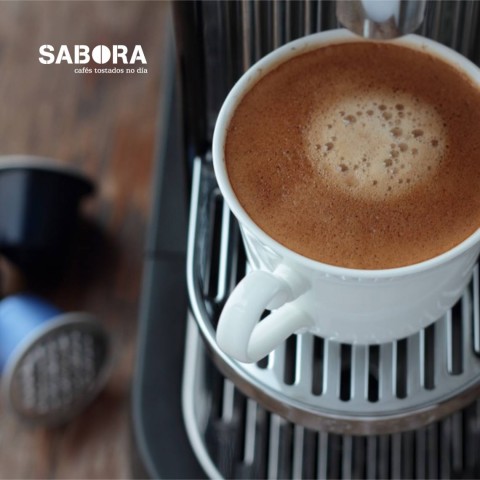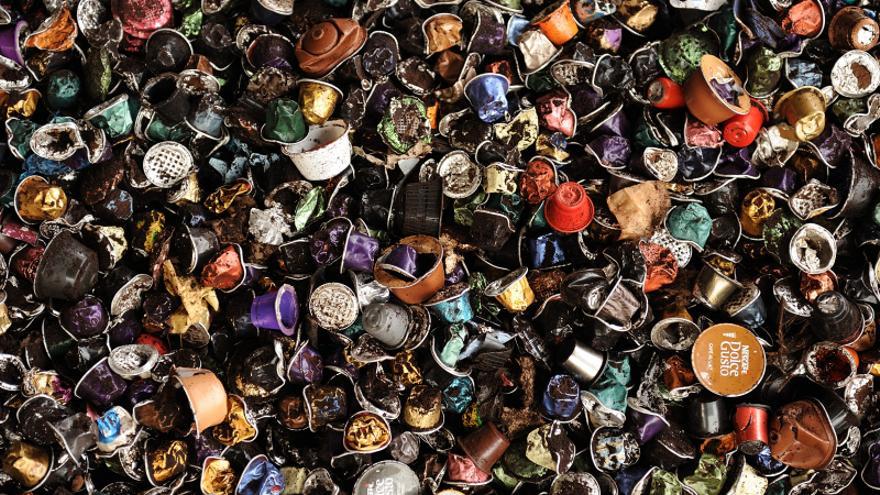COFFEE CAPSULES
The first thing to say is that we do not want to trick anyone, from Cafés Sabora, we are not in favour of coffee capsules, in fact you will not find them on our website. Not on sale now neither in the future.
This decision has been made after considering the results of a research which has brought in half-truths and a great deal of marketing trying to convince us, on the one hand, that these capsules made in a laboratory are good and on the other hand, that they are evil, according to the opponents.
We do not need much time to explain how Nestlé the multinational company, the investment of a lot of million Euros and the movie star George Clooney, have contributed to the success of the trendy capsules over the last years.
As always happens when a product becomes the trend, its supporters and opponents cannot reach agreement.
The opponents of coffee capsules strongly think that this product contains high levels of carcinogenic substance. However, to be fair, this statement should be qualified.
According to the OCU, which is not funded by public grants but membership fees, we may state that actually coffee capsules are not carcinogenic.
-
1st Coffee capsules containing aluminium can be consumed, since coffee is not bitter enough to be contaminated. However, aluminium contamination in food is possible in the case of orange juice and tomato.
-
2nd It is true that aluminium at high pressure and temperature could be dangerous, but it seems that contamination risk is reduced due to the short time of the process.
-
3rd Aluminium is not carcinogenic, but it does have negative effects on reproductive and nervous system, if it is consumed in large quantities.
Besides these not evidenced health problems, the great problems of coffee capsules are the following ones:
- On the one hand, capsules price and on the other hand the waste that is generated. In fact, Hamburg has banned coffee capsules and pods due to sustainability reasons.
- Even though aluminium is easy to recycle, the truth is that each coffee cup prepared using capsules generates 82 g CO2, as Nestlé declares.
When aluminium merges with alimentary lacquer and coffee, the capsule becomes a non-recyclable waste, even if the consumer takes it to the yellow container, the capsule will be sorted and sent anyhow to a dumping site, as required by the applicable Spanish regulation, according to ecologiafacil.com.
Environmental dimension is what really matters and worries us, so we have made the decision of not commercializing coffee capsules.
We strongly believe that the future coffee will be oriented to organic and eco-friendly production processes, which cause as little pollution as possible.
Another important element refers to the high prices of capsules. The same quantity of coffee into a traditional package is much cheaper than coffee in capsules, so customers save money when they choose the first option.
The capsules do not necessary means to have a good coffee. If you want to, follow the recommendations above:
- Origin matters, find out which is the origin of the coffee you like the most.
- Take into consideration when coffee has been roasted, the fresher the better.
- Observe that the product is correctly packaged, once it is open keep it in cool, dry, dark place to avoid coffee absorbs lots of odours and flavours from the surrounding environment.
- If you consume organic coffee, be sure that is produced without using chemical products or substances and subject to a tight control system.
- Buy ground coffee, grind it and, just after, prepare it. This way, the loss of aroma and oxidation will be minimized and coffee will be better preserved.
- The grinding just before consumption would be ideal. Maybe you start your day at 8 in the morning and you do not fancy grinding at 6,30, right? In this case, you could grind some coffee two or three days before and it would be also ok.
Unfortunately, food industry marketing wants to convince consumers that coffee capsules are more convenient, glamourous and sophisticated.
Artisan roasting and packaging makes way to the industrial processing of coffee at Nestlé’s and Nespresso coffee capsules and pods. In addition, the coffee expert known as “barista” makes way to push a button.
We are no longer free to choose the coffee we want to have, since a monopoly has been created and its owners make people consume their specific coffee and machines, by using the power of marketing.
What is not understandable is that people is paying exaggerated prices for a poor coffee, while they are filling the environment with millions of wasted aluminium and plastic capsules.
The original coffee beans are rising up against the deceiving capsules and we are in the battle, even peacefully.
Yes, my friends, we would like you to reflect on the snob habit of having coffee capsules, promoted by millionaire tv adverts, since they do not improve coffee taste, attacks environment and do not have an added value for those who love natural coffee.
Enjoy your coffee freely.


